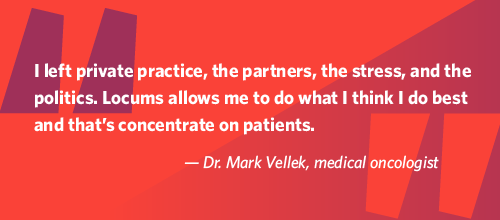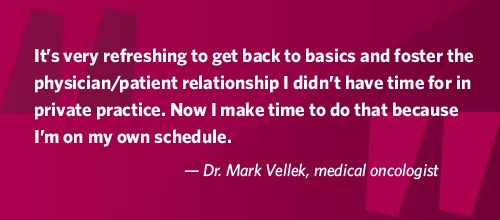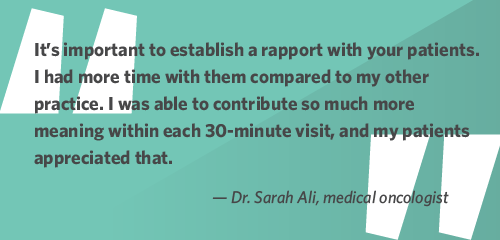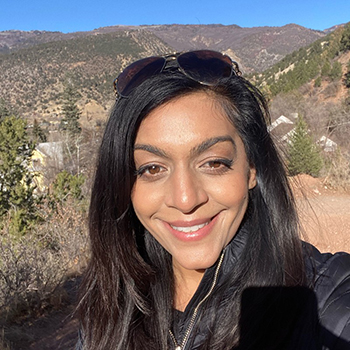After spending 28 years in private practice in Columbia, Missouri, medical oncologist Dr. Mark Vellek decided to retire. He’d felt for a while that his partners saw patients as dollar signs rather than people. Plus, seeing up to 45 patients daily was becoming too much for him. “My mental health wasn’t going to survive any longer in the position I was in,” he says.
On his last day in the clinic, he decided to look into locum tenens as a career alternative that would allow him to continue practicing as a medical oncologist.
With locum tenens, he found the same freedom many medical oncologists have found to practice how he’d always wanted to. Here are stories from several oncologists who rediscovered their passion for medicine with this alternative career choice.
An alternative way to practice oncology
It started with a conversation with a Weatherby Healthcare consultant about his options. “They provided me with a very interesting offer which I hadn’t really considered,” he says. “I didn’t know anything about locums other than that you can go places and work. I wasn’t sure how that worked.”
When he heard there was an open locum tenens assignment on Maui, he was in. “I left private practice, the partners, the stress, and the politics,” Vellek says. “Locums allows me to do what I think I do best and that’s to concentrate on patients.”

Dr. Sarah Ali resonates with Dr. Vellek’s frustration at the unrelenting pace of private practice. “I was getting burned out. Frankly, it was a beautiful practice, but I was seeing over 30 patients a day. I knew that there was another way.”
Dr. Ali says she wasn’t actively considering locums when she first talked to a Weatherby consultant but was willing to explore it. She had been studying integrative medicine for a while and wanted to incorporate it into her oncology practice. One of the first assignments her consultant presented to her was in a practice in Colorado doing just that.
Oncologist Dr. Peter Mancusi-Ungaro, meanwhile, turned to locums to continue doing what he loved after retiring, but on a more flexible schedule. “I retired more than four years ago, but I decided that I’d like to go back and do a little more. I began taking locum tenens opportunities because I wanted to continue seeing patients. Locums has enabled me to enjoy my retirement but still find a purpose,” he says.
Find out more: Why locums makes sense for doctors nearing retirement
Focusing on the physician/patient relationship
“The amount of stress that has been relieved is enormous,” says Dr. Vellek. “I don’t have to worry about traveling; I don’t have to worry about where I’m staying or arranging a car. My concern is to take care of the patient, and everything else follows behind it. It’s been revolutionary for me,” he continues.
“It’s very refreshing to get back to basics and foster the physician/patient relationship I didn’t have time for in private practice,” shares Dr. Vellek. He says he sees half the number of patients per day that he was seeing in private practice, which gives him more time to learn about them.

“The amount of time I get to spend with patients and talk with them — not just about their illness — but ‘Hey, I see you’re sad today. What’s going on?’ I’ve been told about patients’ family dynamics, which is a deeper level of care. In private practice, that’s just not possible.”
Dr. Ungaro has been on a repeat assignment for the last two-and-a-half years. “Going back to the same place over and over allows me to maintain a relationship with my patients, which is important in oncology. I’m able to develop interpersonal relationships that last and continue over time. And with so many patients facing cancer in the United States, locum tenens providers are a necessary part of the equation.”
Locums oncologist Dr. Steven Paul has been similarly surprised at the net positive relationships he has developed in this role. “You don’t have the pressure of running a private practice. You don’t have to deal with billing and medical records and scheduling availability. You actually have the opportunity just to take care of patients.”
Dr. Ali says that now she has been working locum tenens, she enjoys practicing oncology again. She sees fewer patients and has more time to nurture a stronger relationship with them. “I was able to contribute so much more meaning within each 30-minute visit, and my patients appreciated that. I want to spend quality time, not be rushed.”

That said, building a healthy relationship with patients quickly isn’t without its challenges.
“You have to establish a rapport with a patient on the spot,” says Dr. Steven Paul. “The way to do that is to give them confidence by making sure you know the patient’s history very well before you walk in the room.”
“Be prepared that you can convince that patient that you’re as knowledgeable of the patient’s case as the previous doctors may have been,” he continues.
How does it work? One physician discusses locums and continuity of care
Locums bring increased autonomy and flexibility

Locum tenens medical oncologists enjoy a better work/life balance since they control their schedule, which ensures enormous flexibility.
“Hiking, biking, kayaking, whitewater rafting, there is just so much to do in Colorado in all four seasons. I had originally joined on a seven-month contract, but I was enjoying the experience so much, I extended my commitment to almost an 11-month assignment,” says Dr. Ali. “I had so many family and friends come and visit me.”
Dr. Vellek has found that the flexibility of locums allows him to spend more time with his mother, which is especially important to him now that her health is declining. He recently took three months off between assignments to help her through a particularly difficult time. “I was able to sit back and concentrate on family. I took my mom to doctor’s appointments. I was able to be there,” he says. “Before locums, I hadn’t taken off that much time ever. That’s what locums can do.”
Dr. Paul is also pleased with his schedule. “I am calling the shots. I work as often as I want and take off as much time as I want. It is wonderful to have that independence.”
Even more than allowing for autonomy and flexibility, working locum tenens as a medical oncologist provides ample chances to stretch your comfort zone. “It gives me the opportunity to see new practices and get acquainted with new individuals,” highlights Dr. Mancusi-Ungaro.
The professional development opportunities are meaningful, too. Since Dr. Ali’s assignment in Colorado has shown her what it’s like to incorporate integrative medicine into oncology, she’s excited to put it into practice once she’s ready to accept a full-time position. “This experience was so positive for me that I feel like I can keep doing locums until I find the right fit.”
Interested in learning more about locum tenens as a career alternative for medical oncologists? Give us a call at 954.343.3050 or view today’s locum tenens job opportunities.
